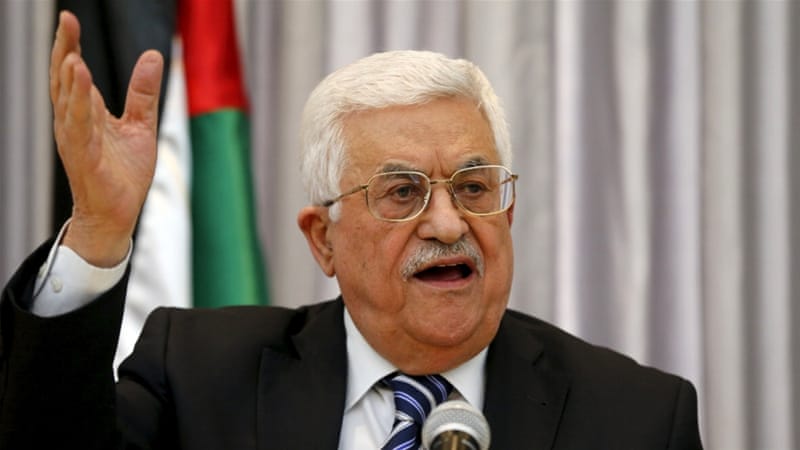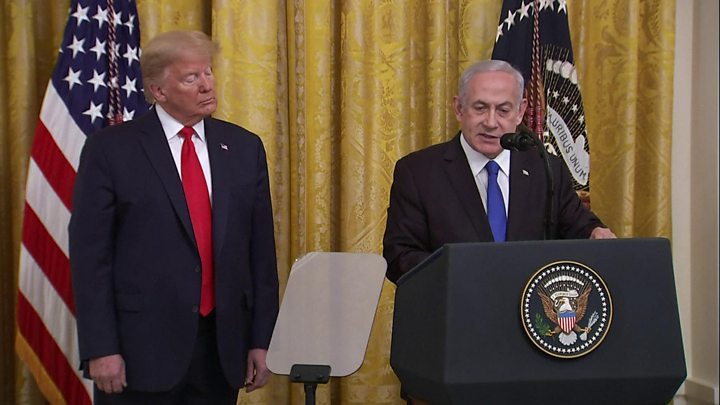Palestinians Reject Trump Middle East plan Calls it a 'Conspiracy'

Palestinians
have dismissed US President Donald Trump's new Middle East peace plan as
a "conspiracy".
The plan
envisages a Palestinian state and the recognition of Israeli sovereignty over
West Bank settlements.
Mr Trump
said Jerusalem would remain Israel's "undivided" capital, but the
Palestinian capital would "include areas of East Jerusalem".
Reacting to
Tuesday's announcement, Palestinian President Mahmoud Abbas said Jerusalem was
"not for sale".
"All
our rights are not for sale and are not for bargain," he added.
Thousands of
Palestinian protesters held a "day of rage" in the Gaza Strip on
Tuesday, while the Israeli military deployed reinforcements in the occupied
West Bank.
The
blueprint, which aims to solve one of the world's longest-running conflicts,
was drafted under the stewardship of President Trump's son-in-law Jared
Kushner.
Standing
alongside Israeli PM Benjamin Netanyahu at the White House on Tuesday, Mr Trump
said his proposals "could be the last opportunity" for Palestinians.
Reports said
Mr Netanyahu was planning to press ahead with annexing 30% of the occupied West
Bank, with a cabinet vote due on Sunday.
Israel has
settled about 400,000 Jews in West Bank settlements, with another 200,000 living
in East Jerusalem. The settlements are considered illegal under international
law, although Israel disputes this.
Speaking on
Tuesday, he said it was "impossible for any Palestinian, Arab, Muslim or
Christian child to accept" a Palestinian state without Jerusalem as its
capital.
"We say
a thousand times, no, no, no," he said. "We rejected this deal from
the start and our stance was correct."
The militant
Palestinian Islamist group Hamas, which controls the Gaza Strip, also rejected
the deal which it said aimed "to liquidate the Palestinian national
project".
The UN said
it remained committed to a two-state solution based on the boundaries in place
before the 1967 war, when Israel seized the West Bank and Gaza.
The Israeli
prime minister described Mr Trump's plan as the "deal of the century"
Israel
"will not miss this opportunity", Mr Netanyahu said.
"May
God bless us all with security, prosperity and peace!" he added.
A spokesman
for UN Secretary General António Guterres called for a peace deal on the basis
of UN resolutions, international law and bilateral agreements.
The Arab
League said it would hold an urgent meeting on Saturday.
British
Foreign Secretary Dominic Raab urged the Palestinians to give the plans
"genuine and fair consideration and explore whether they might prove a
first step on the road back to negotiations".

What are Trump's key
proposals?
The US will
recognise Israeli sovereignty over swathes of the West Bank, including Jewish
settlements and much of the Jordan river valley
The move
will "more than double the Palestinian territory and provide a Palestinian
capital in eastern Jerusalem", where Mr Trump says the US will open an
embassy. The Palestine Liberation Organisation (PLO) said the plan would give
Palestinians control over 15% of what it called "historic Palestine"
Jerusalem
"will remain Israel's undivided capital". The Palestinians insist
East Jerusalem be the capital of their future state
"No
Palestinians or Israelis will be uprooted from their homes" - suggesting
that existing Jewish settlements in the Israeli-occupied West Bank will remain
Israel will
work with Jordan to ensure the status quo governing the key holy site in
Jerusalem known to Jews as the Temple Mount and al-Haram al-Sharif to Muslims
is preserved. Jordan runs the religious trust that administers the site
Territory
allocated to Palestinians in Mr Trump's map "will remain open and
undeveloped for a period of four years". During that time, Palestinians
can study the deal, negotiate with Israel, and "achieve the criteria for
statehood"
Mr Trump
also indicated that the West Bank would not be cut in half under the plan.
"We
will also work to create a contiguous territory within the future Palestinian
state, for when the conditions for statehood are met, including the firm
rejection of terrorism," he said.
Until now
all of the most difficult aspects of an Israeli-Palestinian peace deal - the
so-called final status issues - like borders; the future of Israeli settlements
in the West Bank; the long-term status of Jerusalem; and the fate of
Palestinian refugees, were to be left for face-to-face talks between the
Israelis and Palestinians themselves.
Not any
longer. The deal proposed by President Trump and enthusiastically endorsed by
Prime Minister Netanyahu essentially frames all of these issues in Israel's
favour.
The
Palestinians were not just absent from this meeting - they have boycotted the
Trump administration ever since it unilaterally moved its embassy to Jerusalem.
But they have essentially been presented with an ultimatum - accept the Trump
parameters or else, and they have been given some four years to come around.
While
President Trump is offering the Palestinians a state it would be a much
truncated one. No Jewish settlers will be uprooted and Israeli sovereignty will
apparently be extended to the settlement blocs and the Jordan Valley. The
Palestinians might have a capital in the East Jerusalem suburbs. This
"take it or leave it offer" will appal many long-standing students of
the region. The question now is not so much what benefit this deal might bring but
how much damage it may do by over-turning Palestinian aspirations.
The
Palestinians broke off contacts with the Trump administration in December 2017,
after Mr Trump recognised Jerusalem as Israel's capital and move the US embassy
to the city from Tel Aviv.
Since then,
the US has ended both bilateral aid for Palestinians and contributions for the
UN Relief and Works Agency for Palestine Refugees (UNRWA).
In November,
Secretary of State Mike Pompeo said the US had abandoned its four-decades-old
position that Jewish settlements in the West Bank were inconsistent with
international law.
What are the issues
at stake?
Of all the conflicts in
the Middle East, that between Israel and the Palestinians has been the most
intractable. Although the two sides signed a peace accord in 1993, more than a
quarter of a century on they are arguably as far apart as ever.
Jerusalem: Both
Israel and the Palestinians hold competing claims to the city. Israel, which
occupied the formerly Jordanian-held eastern part in 1967, regards the whole of
Jerusalem as its capital. The Palestinians insist on East Jerusalem - home to
about 350,000 of their community - as their future capital
Palestinian
statehood: The Palestinians want an independent state of their own,
comprising the West Bank, Gaza and East Jerusalem. Israeli prime ministers have
publicly accepted the notion of a Palestinian state alongside Israel - but not
what form it should take. Benjamin Netanyahu has said any Palestinian state
should be demilitarised with the powers to govern itself but not to threaten
Israel.
Recognition: Israel
insists that any peace deal must include Palestinian recognition of it as the
"nation-state of the Jewish people", arguing that without this
Palestinians will continue to press their own national claims to the land,
causing the conflict to endure. The Palestinians say what Israel calls itself
is its own business, but to recognise it as the Jewish state will discriminate
against Israel's Arab population of Palestinian origin, who are Muslims,
Christians and Druze.
Borders: Both
sides have fundamentally different ideas as to where the boundaries of a potential
Palestinian state should be. The Palestinians insist on borders based on
ceasefire lines which separated Israel and East Jerusalem, the West Bank and
Gaza between 1949 and 1967. Israel says those lines are militarily indefensible
and were never intended to be permanent. It has not said where borders should
be, other than making clear its own eastern border should be along the Jordan
River.
Settlements: Since
1967, Israel has built about 140 settlements in the occupied West Bank and East
Jerusalem, as well as 121 outposts - settlements built without the government's
authorisation. Settlements are considered illegal by most of the international
community, though Israel disputes this. Palestinians say all settlements must
be removed for a Palestinian state to be viable. Mr Netanyahu has vowed not
only to never to uproot any settlements but to bring them under Israeli
sovereignty.
Refugees: The
UN says its agencies support about 5.5 million Palestinian refugees in the
Middle East (the Palestinian Authority says there are up to 6 million),
including the descendants of people who fled or were expelled by Jewish forces
from what became Israel in the 1948-49 war. Palestinians insist on their right
to return to their former homes, but Israel says they are not entitled to,
noting that such a move would overwhelm it demographically and lead to its end
as a Jewish state.
FROM .bbc.com/news/world-middle-east

No comments